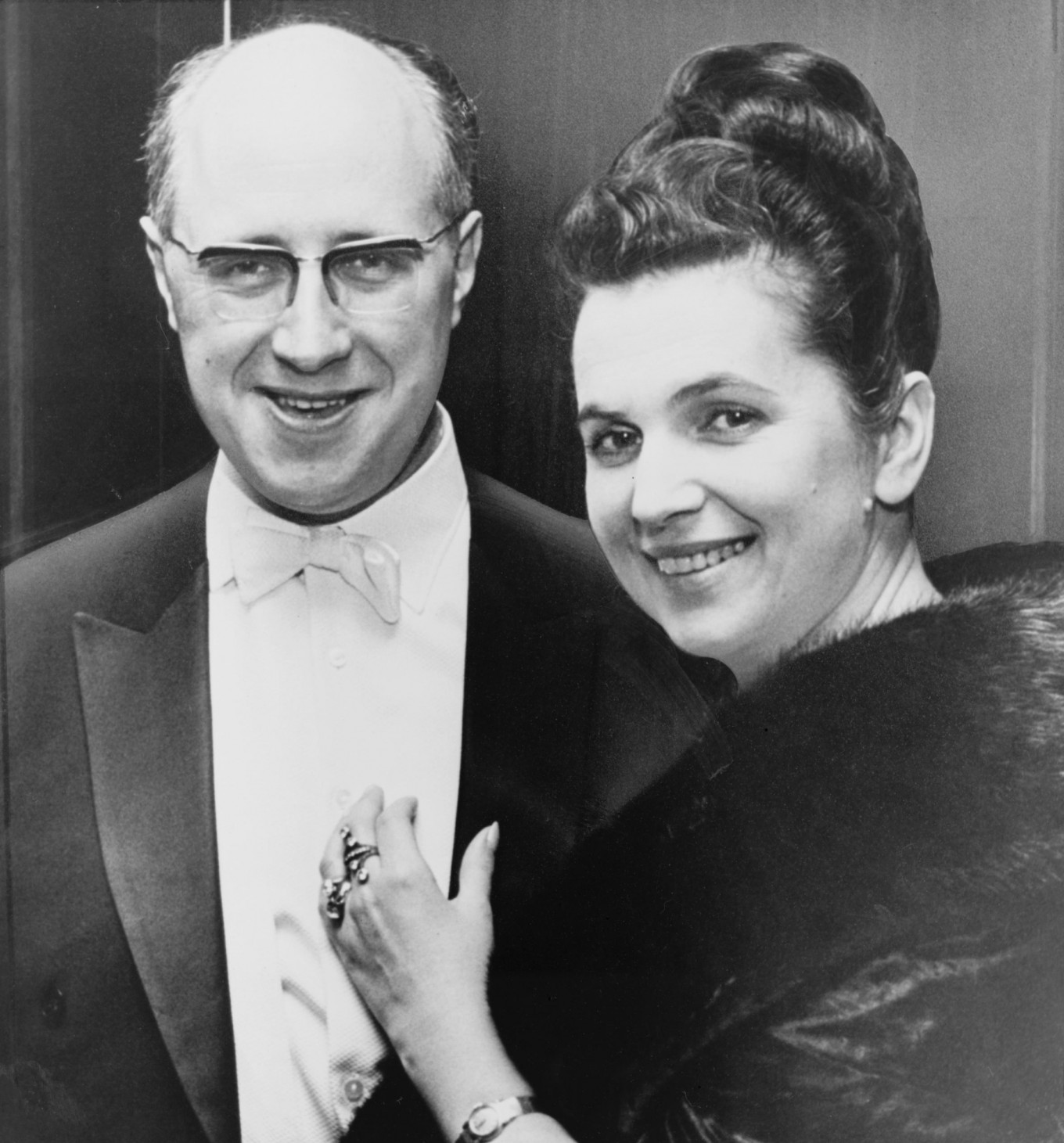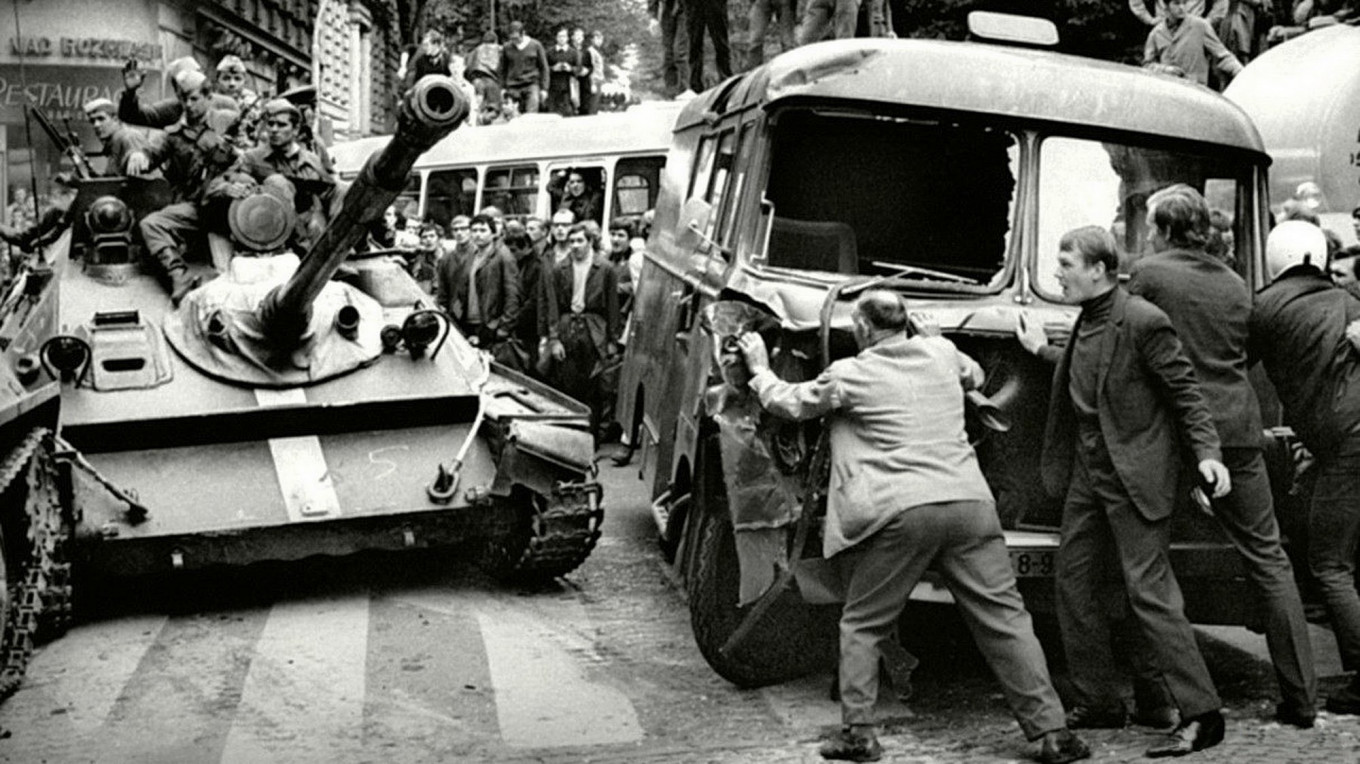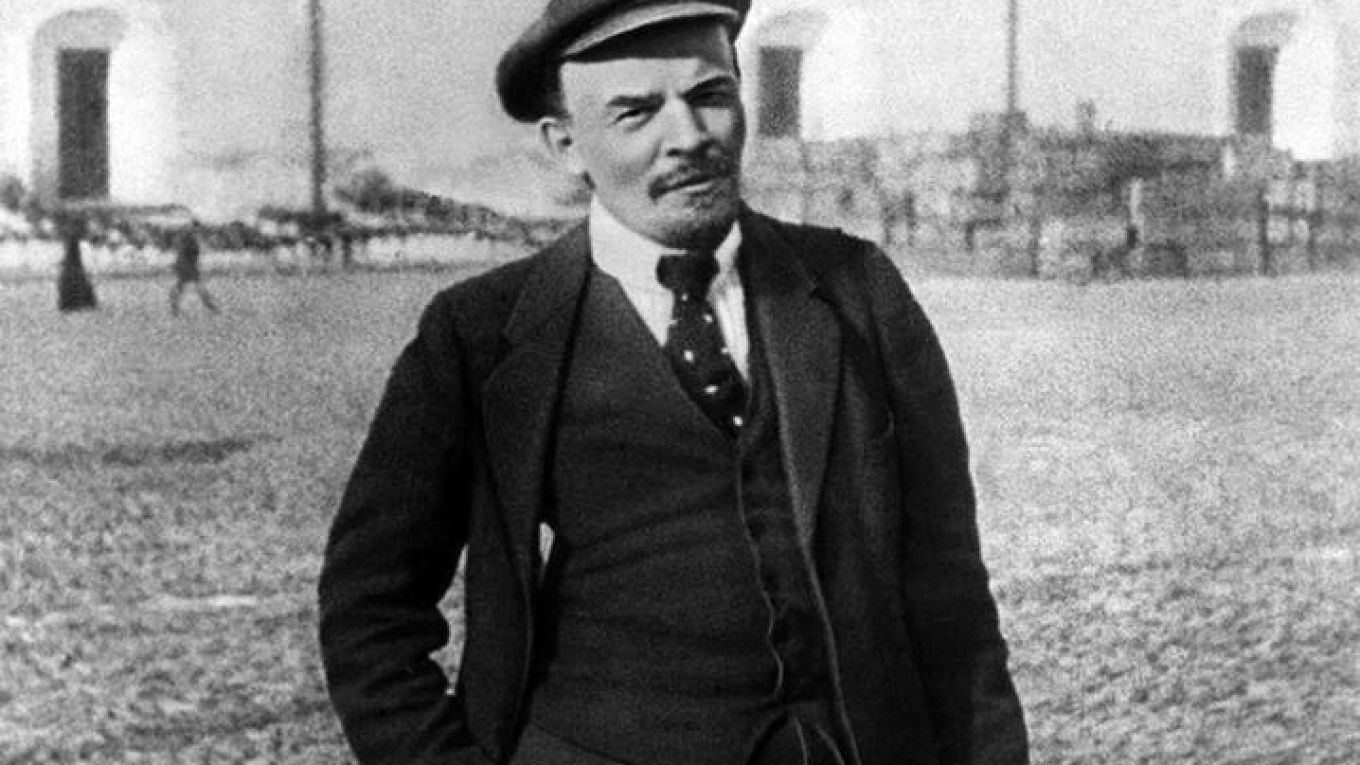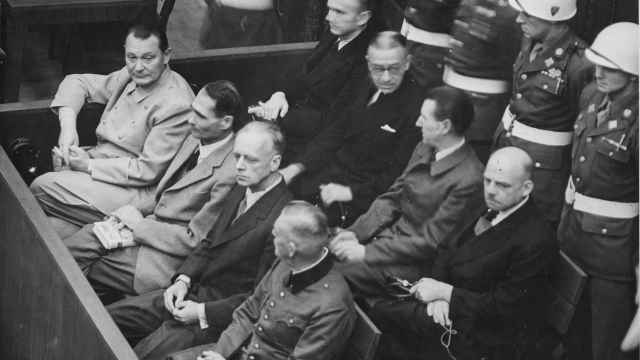It’s Mstislav Rostropovich Meets Vladimir Lenin Week on Moscow TV, as the small screen presents an impressive selection of performance, documentary and feature films in honor of (a) the late maestro’s 90th birthday and (b) the 100th anniversary of the embalmed-but-still-unburied revolutionary’s April Theses.
Viewers who appreciate the cellist-conductor’s great music and exemplary citizenship will be richly rewarded, while those who question whether Russia’s recent obsession with rewriting history has any precedents will get an articulate four-part cinematic response. Here’s the where and when:
MONDAY is the Rostropovich anniversary and Kultura does it four-fold justice. In the morning viewers get a special edition of the cultural omnibus "The Weekday Observer," dedicated to the maestro’s memory: “Mstislav Rostropovich: Solo for Violincello” (2017) features reminiscences from daughter Olga Rostropovich, artistic director of the Mstislav Rostropovich International Festival, and Dmitry Bertman, artistic director of Moscow's Helikon Opera.
In the late afternoon the station moves from the
memorial to the practical, airing a minor pedagogical classic: “Mstislav
Rostropovich: Master-Class at the Moscow Conservatory” (2002) shows the
master-musician at work, joining cellist Yevgeny Tonkha, pianist Tatyana
Mechkova and Germany’s Twins Quartet in the Conservatory’s Small Hall for a fascinating
educational-melodic workout through Brahms, Shostakovich and Prokofiev.
The evening’s lead feature is Tatyana Malova’s fine two-part documentary “Two in the World: Galina Vishnevskaya and Mstislav Rostropovich” (2009), in which viewers get a finely-drawn portrait of the remarkable marriage-alliance of the great cellist-conductor and equally great soprano – a union that came about suddenly, endured 52 years and survived challenging conflicts between the gifted, independent-minded Soviet artists and the great deadening hand of the USSR state apparatus.
The film includes reminiscences and observations from Vishnevskaya (1926-2012), the couple's daughter Olga, some revealing mother-daughter dialogue, considerable performance and off-stage footage of both the maestro and the diva, and unique materials from the family archive. If you can only watch one of Kultura’s Rostropovich features this week, “Two in the World” is probably your best bet.

The evening concludes with a rare live telecast: the Opening of the Eighth International Rostropovich Festival. The broadcast will feature the Academic Symphony Orchestra of St. Petersburg performing Sibelius’s Symphony No. 2 (1902) and two Ravel works: "Ma Mère l'Oye" (Моя матушка-гусыня/"The Mother Goose Suite," 1910) and "La Valse" (Вальс, 1920), the celebrated “choreographic poem for orchestra.”
The Weekday Observer:“Mstislav Rostropovich: Solo for Violincello” / Наблюдатель по будням. “Мстислав Ростропович. Соло для виолончели.” Kultura, Monday at 10:15 a.m.
Mstislav Rostropovich: Master-Class at the Moscow Conservatory / Мстислав Ростропович. Мастер-класс в Московской консерватории. Kultura, Monday at 5:35 p.m.
Two in the World: Galina Vishnevskaya and Mstislav Rostropovich / Двое в мире. Галина Вишневская и Мстислав Ростропович. Kultura, Monday at 8:05 p.m.
Opening of the Eighth International Rostropovich Festival / Открытие VIII Международного фестиваля Мстислава Ростроповича. Kultura, Monday at 9:25 p.m.
On TUESDAY Kultura begins a four-film salute of cine-Leniniana [кинолениниана] with the gold-standard feature of this only-in-Russia genre. Mikhail Romm’s "Lenin in October" (1937) is manifestly unhistorical – indeed ahistorical, as its original counterfactual narrative has been altered twice to suit post-Stalin political preferences (and could be again, of course). Yet the film was and remains a must-see for three reasons, the first being simply that half the people on your bus tomorrow still think it shows what happened in 1917.
It doesn’t, of course, but that’s not the point – and never was. Countries need origin-myths, and this film was enormously effective in establishing and instilling one in and for the Soviet Union some 20 years after the fact. Secondly, no small part of “Lenin’s” success is due to lead actor Boris Shchukin, who created an Ilyich for the ages, literally: as Frank Nugent noted in the NY Times, “His Lenin is a full-sized man, worth anyone's attention.” Or everyone’s, in the Soviet case.
Finally, this “Lenin” is raised above the level of retro-embarrassing propaganda and fake history by the technical and artistic skill of its director. Romm was a fine craftsman with a real sense of drama and characterization – his excellent documentary “Ordinary Fascism” (1965) and fine feature “Nine Days of One Year” (1962) were no accidents – and these skills were admired and emulated by both the next generation of Soviet directors and filmmakers around the world.
Tune in for an orienting introduction by film historian Viktor Listov – perhaps he is the one who suggested the enigmatic rubric “Illusion. Lenin. The Labyrinths of Time” to Kultura for this week’s films – and then settle back and take in Lenin and the Bolshevik coup as millions of your fellow commuters still “remember” them.
Lenin in October / Ленин в Октябре. Kultura, Tuesday at 12:55 p.m. and 11:50 p.m.
Tuesday also continues the Rostropovich tribute, this time billing the performance as “Concert Recordings, 1973-1974.” The featured works are Khachaturian’s Concerto-Rhapsody for Cello and Orchestra and Haydn’s Concerto in C major for Cello and Orchestra.
Mstislav Rostropovich and the USSR Great Symphony Orchestra of State Radio and Television: Concert Recordings, 1973-1974 / Мстислав Ростропович и Большой симфонический оркестр Гостелерадио СССР. Концерт. Запись 1973 и 1974 годов. Kultura, Tuesday at 5:35 p.m.
WEDNESDAY offers a rare un-Russian Lenin for viewers to contemplate in Mikheil Chiaureli’s Georgian-language production “They Wanted Peace” (1938), which features Konstantin Miuffke as Lenin and frequent Stalin-portrayer Mikheil Gelovani as Ilyich’s “best disciple.”
Since 1991 Miuffke’s personification of the Leader has been called “openly parodistic” and the whole film dubbed “mega-trash that earned Chiaureli the title of ‘the red Ed Wood’” – an epithet that’s got to pique anyone’s interest – but it is also seen by some more benignly: One critic terms its 63 minutes of revolutionary hagiography “skillfully made and quite professional – a good-faith second-rate effort.” Our advice: tune in with an eye peeled for signs of Ed Wood in Bolshevik clothing!
They Wanted Peace (aka Diadi gantiadi, aka The Great Glow) / Великое зарево. Kultura, Wednesday at 1:05 p.m. and 11:50 p.m.
Wednesday’s Rostropovich entry is a wonderfully uplifting cross-cultural concert of (very) late Soviet origins: “Mstislav Rostropovich and the Washington National Symphony Orchestra” (1990) records the maestro, returned to Moscow after 16 years of exile, as he conducts his adopted “home orchestra” in works by Strauss, Shostakovich and Grieg – to ecstatic cries of “Encore!” from the Soviet audience.
Mstislav Rostropovich and the Washington National Symphony Orchestra / Мстислав Ростропович и Вашингтонский национальный симфонический оркестр. Kultura, Wednesday at 5:35 p.m.
THURSDAY presents a Lenin-for-the-masses feature that enjoyed the unusual distinction of disappearing from public view immediately after the Party chieftain who sponsored it did. “The Blue Notebook” (1963), filmed by the talented Lev Kulidzhanov from the Emmanuil Kazakevich novella, shows a more “humanized” Ilyich (Mikhail Kuznetsov) during the trying summer of 1917 – the period when he is in hiding and/or cahoots with various comrades (Sverdlov, Dzerzhinsky, Ordzhonikidze), grinding out “State and Revolution” and pondering the takeover of Russia.
Released in 1964, “Notebook” was summarily pulled from circulation shortly after Leonid Brezhnev and Co. dethroned Nikita Khrushchev in October of that year: either Lenin was too human or the film’s surprisingly two-dimensional portrayal of henchman Grigory Zinoviev – or both – proved too much for the rising Deep Stagnation leadership to leave in public view. Tune in and see what everybody missed!
The Blue Notebook / Синяя тетрадь. Kultura, Thursday at 12:55 p.m. and 11:50 p.m.
Thursday’s Rostropovich entry is another sure-fire crowd pleaser, as the maestro shows his affinity with Europe’s greatest chansonnier in “Mstislav Rostropovich, Charles Aznavour, Theodor Guschlbauer and the Strasbourg Philharmonic Orchestra” (1995). Tune in for a unique chance to hear how Aznavour’s pop hits happily shared a stage with the great cellist and Dvořák’s Concerto for Cello and Orchestra in B Minor.
Mstislav Rostropovich, Charles Aznavour, Theodor Guschlbauer and the Strasbourg Philharmonic Orchestra / Мстислав Ростропович, Шарль Азнавур, Теодор Гушльбауэр и Страсбургский филармонический оркестр. Kultura, Thursday at 5:35 p.m.
On FRIDAY viewers get their final Lenin of the week, and he’s an interesting one indeed. Yury Karasik’s “The Sixth of July” (1968) shows the Bolshevik leader in 1918, during the anti-Bolshevik revolt of the Left Socialist Revolutionaries, “in a state of confusion, turmoil and abandonment” as events overtake him – not the Ilyich audiences were used to, of course, but one they apparently went for in a big way: The film sold an astonishing 33 million tickets!
In reality, it turns out, the reason for this popularity likely had little to do with Yury Kayurov’s “accessible” Lenin (who gets hold of himself soon enough, of course); more to do Mikhail Shatrov’s close-to-genuinely-historical scenario (adapted from his play); and most to do with the film’s “fortuitous” timing: It was released two months after the brutal Soviet suppression of Czechoslovakia’s attempt to forge “Socialism with a human face,” and the smashing of the “Prague Spring” movement served as a convenient (though inaccurate) analogy for many worried citizens to the “rough-but-necessary” treatment visited upon Dubcek and his “misguided idealists.” Tune in and see which rationale works for you.

The Sixth of July / Шестое июля. Kultura, Friday at 12:55 p.m. and 11:50 p.m.
Friday’s final Rostropovich installment is another winning cross-cultural affair: “Mstislav Rostropovich in Concert with the Berlin Philharmonic” (1990) presents the maestro as both conductor and soloist, joined by Vladimir Spivakov and Yury Bashmet in spirited performances of Tchaikovsky, Schnittke and Shostakovich.
Mark H. Teeter is the editor of Moscow TV Tonite on Facebook.
A Message from The Moscow Times:
Dear readers,
We are facing unprecedented challenges. Russia's Prosecutor General's Office has designated The Moscow Times as an "undesirable" organization, criminalizing our work and putting our staff at risk of prosecution. This follows our earlier unjust labeling as a "foreign agent."
These actions are direct attempts to silence independent journalism in Russia. The authorities claim our work "discredits the decisions of the Russian leadership." We see things differently: we strive to provide accurate, unbiased reporting on Russia.
We, the journalists of The Moscow Times, refuse to be silenced. But to continue our work, we need your help.
Your support, no matter how small, makes a world of difference. If you can, please support us monthly starting from just $2. It's quick to set up, and every contribution makes a significant impact.
By supporting The Moscow Times, you're defending open, independent journalism in the face of repression. Thank you for standing with us.
Remind me later.







